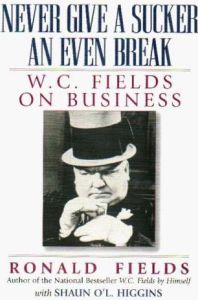Join getAbstract to access the summary!

Join getAbstract to access the summary!
Ronald Fields and Shaun O.L. Higgins
Never Give a Sucker an Even Break
W.C. Fields on Business
FT Prentice Hall, 2000
What's inside?
If you know how to take business wisdom wherever you can find it, you’ll appreciate the gems hidden in the work of comedian W.C. Fields, who notes among other things, “You can fool half the people all the time...and that’s enough to make a good living.”
Recommendation
W.C. Fields’s grandson, Ronald Fields, draws on the comic’s biography, movie plots and sayings to illustrate key business principles. He covers such topics as leadership, creativity and innovation, managing change, effective teamwork, delegation, budgeting, office politics, and communication. Many of the ideas for business success are familiar, but the link with W.F. Fields makes them novel and entertaining. Appropriately, the book is written in a breezy style that makes it enjoyable to read, and Fields includes a summary of key principles at the end of each chapter. getAbstract particularly likes the collection of W.C. Fields’s humorous sayings at the end of the book. Even though some ideas and, for shame, even some sentences are repeated, the book has broad appeal for anyone who likes business and loves to laugh. If you’re thinking stocking stuffer or get-well gift, this’ll do.
Summary
About the Authors
Ronald Fields , the grandson of W.C. Fields, wrote the bestseller W.C. Fields by Himself. A playwright, he won an Emmy for the screenplay for W.C. Fields Straight Up. He has lectured on W.C. Fields and creative writing at more than 500 colleges and universities, and is currently the vice president of creative development at Hollywood-on-Air. Shaun O’L. Higgins is chairman and CEO of Print Marketing Concepts, Inc. He wrote several books, including The Newspaper in Art. In 1986, he began using movies to train new managers at Cowles Publishing Company in Spokane, Washington, and he serves as the director of marketing and sales at Spokane’s newspaper, The Spokesman Review.
















Comment on this summary